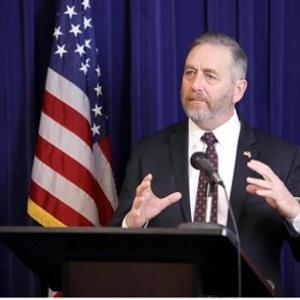Victims of violence and terror are not necessarily well served by a system that promises “closure” in the form of the death penalty, according to a recent Washington Post column by Dahlia Lithwick. Among other cases, the author questions the assumptions in the federal government’s case against Zacarias Moussaoui as it relates to the needs of the family members from the September 11th attack:
The death penalty trial of Zacarias Moussaoui has been touted by the government as a way to bring resolution to bereft families. Hundreds watch the proceedings on remote, closed-circuit televisions. Dozens will testify about their losses. This will be their “day in court.” Since as far back as 2002, when then-Attorney General John D. Ashcroft announced he’d seek the death penalty for Moussaoui to “carry out justice,” it’s been assumed that this outcome would bring closure. Just as, in 2001, when Ashcroft decided that family members of the Oklahoma City bombing victims could witness the execution of Timothy McVeigh on closed-circuit television, he said it would “meet their need for closure.”
Why? What’s the empirical basis for the government assumption that all, or even most victims of terrible tragedy will find “closure” through protracted trials and executions?
…
In a seminal 1985 law review article, law professor Lynne Henderson examined the relationship between victims’ rights and criminal justice policy. Looking carefully at the psychological data on the needs of victims, Henderson discovered a wide array of responses to tragedy — responses that differ widely from victim to victim, and that change significantly over a victim’s lifetime. More crucially, Henderson’s research reveals that “common assumptions about crime victims — that they are all ‘outraged’ and want revenge and tougher law enforcement — underlie much of the current victim’s rights rhetoric. But in light of the existing psychological evidence, these assumptions fail to address the experience and real needs of past victims.”
Criminal trials and the promise of an execution offer a seemingly appealing tool for assigning blame and channeling rage. But many crime victims have reported that the endless repetition of their tragic stories, the formal legal rules, and the years and years between appeals only serve to increase stress and delay healing.
…
Many, many victims of violent tragedy object to this assumption that their interest in justice is congruent with that of state prosecutors seeking the death penalty. Just last month, Vicki Schieber, the mother of Shannon Schieber, a Wharton Business School student murdered in 1998 by a serial rapist, testified before the U.S. Senate’s subcommittee on the Constitution, civil rights and property rights. As she told the committee: “The word closure is invoked so frequently in discussions of victims and the death penalty that victims’ family members jokingly refer to it as ‘the c word.’ But I can tell you with all seriousness that there is no such thing as closure when a violent crime rips away the life of someone dear to you.” Schieber testified that a single-minded government focus on executions shifts the focus away from other, more meaningful legal reforms that might better honor victims and support their families.
(Washington Post, March 26, 2007, Outlook Section (emphasis added). Dahlia Lithwich covers legal affairs for the online magazine Slate). Read the full text of Lithwick’s column. See Victims and other Sept. 11 material.
Victims' Families
Dec 17, 2024
Indiana’s First Execution in 15 Years Raises Serious Constitutional Concerns
New Voices
Dec 13, 2023

